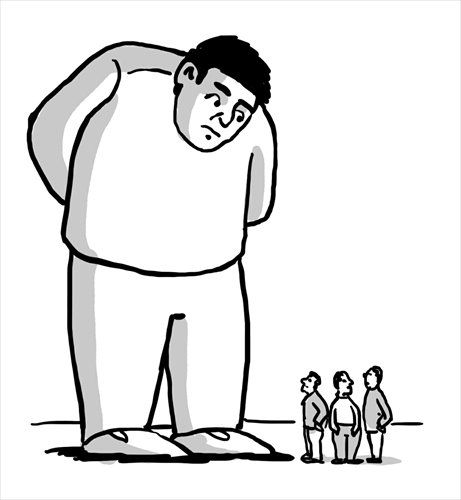HOME >> OP-ED
Rules essential to avoid power games in Asia
By Ding Gang Source:Global Times Published: 2013-10-9 20:08:01

Illustration: Liu Rui/GT
There has been a strange phenomenon emerging in Asia: Whenever the economic balance tilts toward China, many people would hope the US adds weight in its own scale to make it balanced.
During the just concluded APEC forum, the absence of US President Barack Obama made his Chinese counterpart Xi Jinping's appearance more dazzling, which made some automatically think of the US.
Singaporean Prime Minister Lee Hsien Loong said, "America has to continue to be engaged in this region because it plays a very important role which no other country can replace, not China, not Japan, not any other power. And that is something which we continue to encourage in every opportunity."
But Lee's remarks sound more like expressing a certain concern that stems from the fact that the balance of Asian powers has been broken by China's rise.
For a long time, many smaller countries in Asia like Singapore have hoped that with the balance or the rivalry between China and the US, they could gain more interests.
However, such balance cannot keep long. This is because China's rise cannot be stopped and the US is unlikely to keep inputting into this region as much as China does. The absence of Obama proves this.
The fact that Asian countries still pin their hopes on the balance of power between China and the US reflects their lack of trust in China's rise, and that the political and security mechanisms in this region are yet to be formed.
The key for China successfully building trust with neighboring countries in the future does not only lie in making them enjoy the economic benefits from China's development.
Exchanges on culture and other aspects will help build mutual trust. In an era when a new order is to be established, stable relationships between countries are ultimately guaranteed by cooperation mechanisms.
From this perspective, what we need to cultivate now may not be friendship, but primarily a legal basis that could brew friendship.
That said, if we do not want Asian countries to seek a balance of power in their foreign policies, we need to change the current international relations in Asia thoroughly and instead build a new international principles among countries.
There are still some potential risks in terms of ethnic, religious and border conflicts in Asian countries. The elimination of these risks can only rely on rules.
To solve ethnic and border conflicts through peaceful negotiation is a process of establishing new orders and new rules.
For China, establishing new rules also means innovation. The visions China has raised regarding economic and trade mechanisms, for example the establishment of an Asian Infrastructure Investment Bank proposed by Xi, show the promise of new rules.
No rule means the rule of the jungle. Asia has walked out of the jungle without rules. Stepping back fits nobody's fundamental interests.
Some people believe that how the US will deal with a rising China in the future is a vital factor that affects the pattern in Asia. But in the trilateral relations among China, the US and other Asian countries, China has remained the most active party.
The rise of a big power is always accompanied by new rules. What rules will be adopted to guarantee smooth cooperation between China and other Asian countries? And how will China promote the new order through cooperation? These new game rules will be the mainspring of Asia in the future.
If China can become the main initiator of Asian cooperation mechanisms, it will be unnecessary to think about balancing the US against China. The next key step for China is to expand economic cooperation mechanisms to those in political and security fields.
The author is a senior editor with People's Daily. He is now stationed in Brazil. dinggang@globaltimes.com.cn http://twitter.com/dinggangchina
Posted in: Columnists, Critical Voices